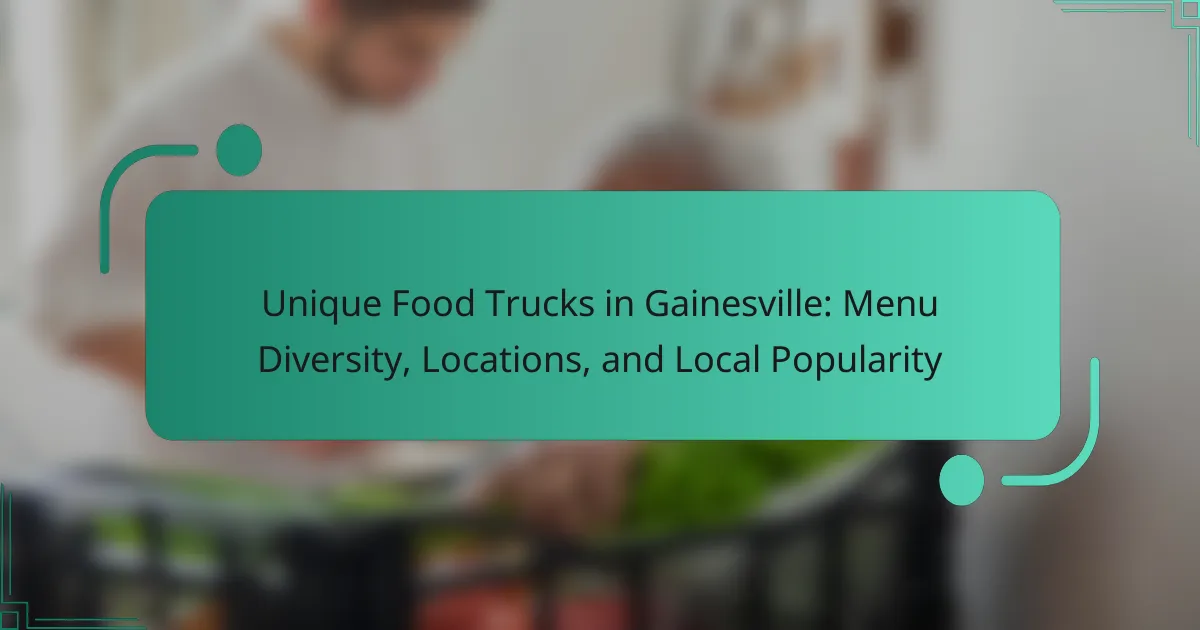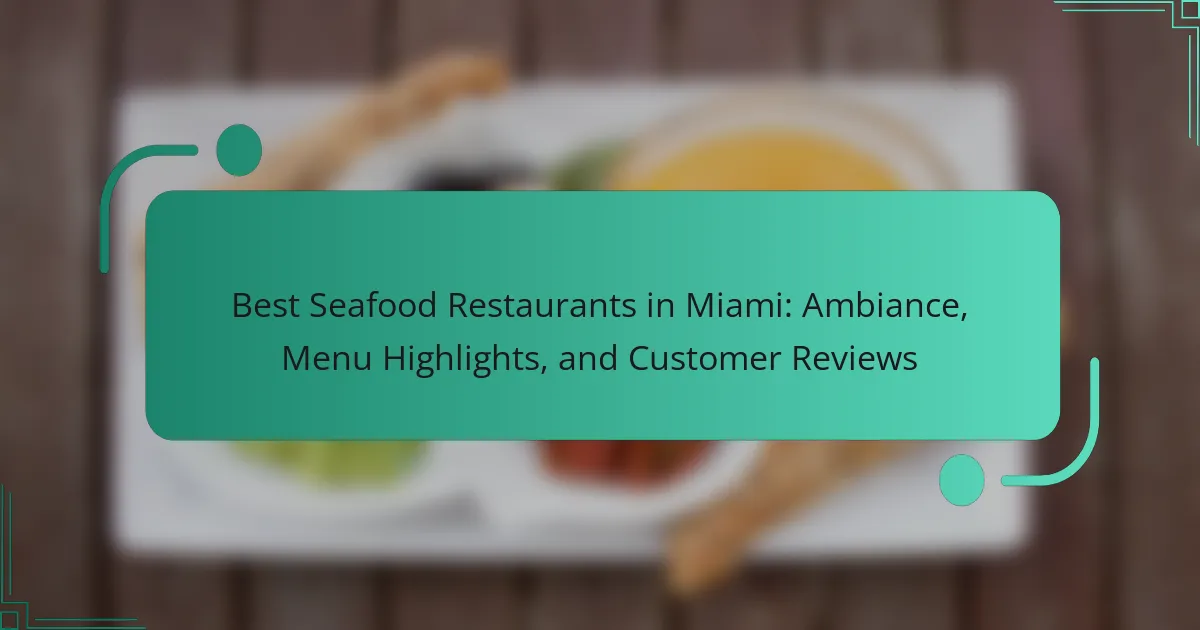Gainesville’s food trucks are characterized by their diverse menus and commitment to local sourcing, reflecting the city’s multicultural community. These trucks offer a wide range of cuisines, emphasizing fresh ingredients that support regional farmers and promote sustainability. Frequently rotating locations, such as downtown, the University of Florida campus, and local parks, enhance accessibility for residents. The popularity of these food trucks is driven by menu diversity, strategic positioning, quality food, and active participation in community events, all contributing to a vibrant culinary scene in Gainesville.

What Makes Gainesville’s Food Trucks Unique?
Gainesville’s food trucks are unique due to their diverse menus and local sourcing. They offer a wide variety of cuisines, reflecting the city’s multicultural community. Many trucks emphasize fresh, locally-sourced ingredients, enhancing flavor and quality. This commitment to local produce supports regional farmers and reduces carbon footprints. Additionally, food trucks frequently rotate locations, providing accessibility and convenience to residents. Their popularity is evident in community events, where they often gather, attracting large crowds. This vibrant scene fosters a sense of community and culinary exploration.
How do food trucks contribute to Gainesville’s culinary scene?
Food trucks significantly enhance Gainesville’s culinary scene by introducing diverse food options. They offer a variety of cuisines that reflect the multicultural makeup of the community. This diversity attracts both locals and visitors, stimulating interest in culinary exploration. Food trucks often feature unique dishes not commonly found in traditional restaurants. Their mobility allows them to reach different neighborhoods and events, increasing accessibility to diverse food experiences. According to local reports, food trucks contribute to the local economy by providing jobs and supporting small businesses. They also foster a sense of community by participating in local festivals and gatherings. This engagement helps build a vibrant food culture in Gainesville.
What types of cuisine are represented by food trucks in Gainesville?
Food trucks in Gainesville represent a diverse range of cuisines. Common types include Mexican, American, Asian, and Mediterranean. Each food truck often specializes in unique dishes reflecting these culinary traditions. For example, Mexican food trucks may serve tacos and burritos. American trucks typically offer burgers and sandwiches. Asian cuisine can include sushi and noodle dishes. Mediterranean options often feature gyros and falafel. This variety caters to different tastes and preferences in the local community.
How do food trucks reflect local culture and preferences?
Food trucks reflect local culture and preferences by offering cuisine that resonates with the community’s tastes. They often feature regional ingredients and traditional recipes, showcasing local culinary heritage. For example, a food truck in Gainesville may serve Southern comfort food, highlighting local flavors. The diversity in menus caters to various dietary preferences, such as vegan or gluten-free options, reflecting the community’s demographic. Additionally, food trucks frequently participate in local events, fostering a sense of community. Their locations are strategically chosen based on popular gathering spots, enhancing accessibility. Overall, food trucks serve as a dynamic representation of local culture and evolving food trends.
Why is menu diversity important for food trucks?
Menu diversity is important for food trucks because it attracts a wider customer base. A varied menu caters to different tastes and dietary preferences. This inclusivity can lead to increased sales and customer loyalty. Food trucks with diverse offerings often stand out in competitive markets. Research shows that consumers prefer options that accommodate their dietary needs, such as vegetarian or gluten-free choices. Offering unique dishes can also create buzz and draw in new customers. Overall, menu diversity enhances the food truck’s appeal and profitability.
What are the most popular food truck menu items in Gainesville?
The most popular food truck menu items in Gainesville include tacos, gourmet burgers, and BBQ sandwiches. Tacos are favored for their variety and flavor combinations. Gourmet burgers attract customers with unique toppings and locally sourced ingredients. BBQ sandwiches are popular for their smoky flavors and tender meats. These items reflect the local culinary trends and preferences in Gainesville. Food trucks often rotate their menus, but these staples consistently draw crowds. Popular food trucks like The Taco Bus and The BBQ Shack contribute to this diverse offering.
How do seasonal ingredients influence food truck menus?
Seasonal ingredients significantly influence food truck menus by allowing operators to offer fresh, locally sourced options. This practice enhances flavor and quality, appealing to health-conscious consumers. Seasonal ingredients often dictate the variety of dishes available at different times of the year. For instance, summer may feature fresh tomatoes and corn, while winter could highlight root vegetables and hearty greens. Utilizing these ingredients can also reduce costs, as they are typically more abundant and less expensive during their peak season. Additionally, food trucks that adapt their menus seasonally can create excitement and anticipation among customers, encouraging repeat visits. This strategy aligns with the growing trend of farm-to-table dining, which emphasizes sustainability and local agriculture.

Where Can You Find Unique Food Trucks in Gainesville?
Unique food trucks in Gainesville can be found at various popular locations. The downtown area hosts several food trucks, especially during events and festivals. The University of Florida campus also features food trucks catering to students and visitors. Local parks, such as Depot Park, often have food truck gatherings. Additionally, food truck rallies are organized periodically, showcasing a variety of unique cuisines. Check local social media pages for updates on their locations and schedules. These venues provide a diverse range of food options from different cultures and culinary styles.
What are the best locations for food trucks in Gainesville?
The best locations for food trucks in Gainesville include the University of Florida campus, downtown Gainesville, and local parks. The University of Florida campus attracts a large student population, making it ideal for food trucks. Downtown Gainesville hosts events and festivals, providing high foot traffic. Local parks, such as Depot Park, offer a relaxed environment for food truck gatherings. These locations consistently draw crowds, enhancing visibility and sales for food trucks.
How do food truck locations change throughout the week?
Food truck locations change throughout the week based on demand and local events. Many food trucks operate in high-traffic areas during weekdays, such as business districts or near universities. On weekends, they often move to parks, festivals, or events that attract larger crowds. This strategy maximizes customer reach and sales. Additionally, some food trucks may rotate locations daily, following a schedule to serve different neighborhoods. Research shows that food trucks adapt their locations to align with community activities and preferences. This flexibility allows them to thrive in the competitive food service market.
What events or festivals feature food trucks in Gainesville?
Food trucks are featured at various events and festivals in Gainesville. Notable events include the Gainesville Food Truck Rally held monthly. This event showcases a variety of food trucks offering diverse cuisines. Another popular festival is the Downtown Festival & Art Show, which also includes food trucks among its attractions. The Hogtown Craft Beer Festival features food trucks alongside local breweries. Additionally, the Gainesville Christmas Market features food trucks during the holiday season. These events highlight the vibrant food truck scene in Gainesville, attracting both locals and visitors.
How do food truck locations impact their popularity?
Food truck locations significantly impact their popularity by influencing customer accessibility and visibility. Proximity to high foot traffic areas, such as parks, events, and busy streets, increases customer engagement. Studies indicate that food trucks near universities or business districts attract more patrons due to the concentration of potential customers. Additionally, strategic placement during local events or festivals enhances visibility and draws larger crowds. Accessibility also plays a vital role; locations with ample parking or seating options encourage more visitors. Therefore, food truck popularity correlates strongly with their chosen locations, as evidenced by higher sales figures in prime areas.
What role do high-traffic areas play in food truck success?
High-traffic areas are crucial for food truck success. They provide maximum visibility and access to potential customers. Locations with heavy foot traffic, such as busy streets or events, increase the likelihood of sales. Research shows that food trucks in high-traffic zones generate significantly higher revenue. For example, a study by the National Food Truck Association found that trucks positioned near popular attractions earn up to 50% more. This correlation highlights the importance of strategic placement for attracting customers.
How do food truck gatherings foster community engagement?
Food truck gatherings foster community engagement by creating social spaces for interaction. These events bring together diverse groups of people. Attendees can share food experiences and discover new cuisines. Local food trucks often feature unique offerings that reflect community culture. This culinary diversity encourages conversations among attendees. Moreover, food truck gatherings support local businesses and entrepreneurs. They provide a platform for local chefs to showcase their talents. Studies show that such events can strengthen community ties and promote local pride.

What Factors Influence the Popularity of Food Trucks in Gainesville?
The popularity of food trucks in Gainesville is influenced by several key factors. One major factor is the diversity of the menu offerings. Food trucks that provide unique and varied cuisine attract a wider audience. Additionally, strategic locations play a crucial role. Trucks positioned near busy areas or events see higher foot traffic. The quality of food and customer service also impacts popularity. Positive reviews and social media presence enhance visibility and reputation. Local events and festivals further boost attendance at food trucks. Seasonal offerings can also create excitement and attract repeat customers. Overall, these factors collectively contribute to the success and popularity of food trucks in Gainesville.
How do customer reviews affect a food truck’s popularity?
Customer reviews significantly impact a food truck’s popularity. Positive reviews enhance visibility and attract new customers. They serve as social proof, influencing potential patrons’ decisions. High ratings often lead to increased foot traffic. Negative reviews can deter customers and harm reputation. According to a survey, 84% of people trust online reviews as much as personal recommendations. This trust translates into increased sales for food trucks with favorable ratings. Overall, customer reviews are crucial in shaping a food truck’s success and community presence.
What social media platforms are most effective for promoting food trucks?
Instagram and Facebook are the most effective social media platforms for promoting food trucks. Instagram’s visual focus allows food trucks to showcase appealing images of their dishes. This platform has over 1 billion active users, making it ideal for reaching a large audience. Facebook also offers targeted advertising options and community engagement features. With 2.8 billion monthly active users, food trucks can connect with local customers effectively. Both platforms enable food trucks to share real-time location updates and engage with followers. This interaction fosters a loyal customer base. Additionally, user-generated content on these platforms can enhance visibility. Food trucks can benefit from hashtags and location tagging to attract more patrons. Overall, Instagram and Facebook provide essential tools for food truck marketing.
How do food truck owners engage with their customers online?
Food truck owners engage with their customers online through social media platforms. They use platforms like Instagram and Facebook to share photos of their food. This visual content attracts potential customers and showcases menu items. Regular updates about locations and operating hours help customers find them easily. Engaging posts often include customer reviews and feedback. Food truck owners may also run promotions and contests online. This interaction fosters a sense of community among followers. Additionally, they often encourage user-generated content by asking customers to share their experiences.
What role does local sourcing play in food truck popularity?
Local sourcing significantly enhances food truck popularity by appealing to consumer preferences for fresh and sustainable ingredients. Food trucks that use locally sourced ingredients often attract customers who value quality and support for local farmers. This practice fosters a sense of community and connection between the food truck and its patrons. According to a survey by the National Restaurant Association, 70% of consumers are more likely to visit restaurants that offer locally sourced food. Additionally, local sourcing can differentiate a food truck’s menu, creating unique offerings that stand out in a competitive market. This uniqueness can lead to increased customer loyalty and repeat business. Overall, local sourcing contributes to a food truck’s identity and strengthens its relationship with the local community.
How do food trucks build relationships with local suppliers?
Food trucks build relationships with local suppliers through consistent communication and collaboration. They often seek out local farmers and producers to source fresh ingredients. By establishing direct lines of communication, food trucks can negotiate prices and ensure product quality. Regular visits to local markets help food trucks connect with suppliers personally. They may also participate in community events to strengthen ties with local businesses. Building trust is essential, as food trucks rely on suppliers for timely deliveries. Many food trucks highlight their local sourcing on menus, promoting a sense of community. This transparency can enhance customer loyalty and support for local suppliers.
What are the benefits of using locally sourced ingredients?
Using locally sourced ingredients enhances food quality and supports local economies. Freshness is a key benefit, as these ingredients are often harvested at peak ripeness. This results in better flavor and nutritional value. Additionally, locally sourced ingredients reduce transportation emissions. This contributes to lower carbon footprints. Supporting local farmers stimulates the local economy. It fosters community relationships and promotes sustainable practices. According to the USDA, local food systems can increase regional economic activity. This leads to a stronger community connection and greater food security.
What Tips Can Help You Discover the Best Food Trucks in Gainesville?
To discover the best food trucks in Gainesville, consider checking local food truck directories and social media platforms. Websites like Food Truck Finder provide listings and reviews. Social media platforms often showcase food trucks with user-generated content. Attend local food festivals or events where multiple food trucks gather. Engaging with local food blogs can also offer insights into popular options. Networking with locals can yield personal recommendations. Lastly, exploring different neighborhoods may reveal hidden gems. These methods ensure a comprehensive search for quality food trucks.
How can you stay updated on food truck locations and events?
You can stay updated on food truck locations and events by following their social media accounts. Many food trucks post their schedules and locations on platforms like Facebook and Instagram. You can also check local food truck tracking apps for real-time updates. Websites dedicated to local food events often list food truck gatherings and schedules. Local community boards and newsletters frequently share information about food truck events. Engaging with food truck enthusiasts in online forums can provide additional insights. Many food trucks also have mailing lists for direct updates. Following these sources helps ensure you never miss a food truck event.
What should you consider when trying a new food truck for the first time?
When trying a new food truck for the first time, consider the menu options available. Different food trucks offer unique cuisines and specialties. Check for customer reviews and ratings to gauge quality. Observe the cleanliness of the truck and food preparation area. Look for the presence of a health inspection certificate. Consider the wait time and service speed during busy hours. Evaluate the pricing in relation to portion sizes and quality. Finally, assess the location and accessibility of the food truck. These factors contribute to a positive food truck experience.
Unique food trucks in Gainesville are characterized by their diverse menus, local sourcing, and vibrant community presence. This article explores how these food trucks enhance the local culinary scene by offering a wide range of cuisines, reflecting the multicultural makeup of the city. Key factors influencing their popularity include strategic locations, seasonal ingredients, and community engagement through events and festivals. Additionally, the article highlights the importance of menu diversity, local sourcing, and customer reviews in shaping the success of food trucks in Gainesville.



